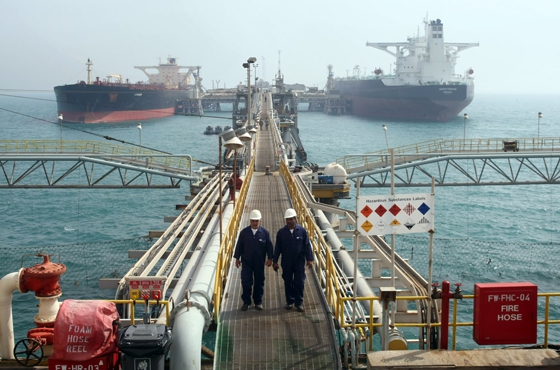Iraq’s first-ever export of gas from its southern oilfields will add a new source of export revenue to the struggling government’s coffers.
The Basra Gas Company (BGC), a partnership between Iraq’s South Gas Company and Royal Dutch Shell, confirmed yesterday that it had exported the first cargo of associated gas condensate from its much-delayed project near the southern port city of Basra on Sunday.
“This first condensate cargo leaving BGC’s marine terminal … opens up a new revenue stream for the country at a time of real need," said the deputy minister of oil for gas affairs, Hamid Younis.
The US$17 billion project to gather, process and sell gas that was otherwise being flared at the three major oilfields – Rum¬aila, Zubair and West Qurna – was signed in 2011. It is the largest gas flare-reduction project in the world.
“Within the challenging economic climate the country finds itself in, we believe that starting up a project that sells domestic products that diversifies the country’s revenue is an important achievement for Iraq and BGC," Shell’s Dubai-based spokesman for the region said.
BGC is a 25-year project in which the Iraq government’s Southern Gas Company has a 51 per cent stake, Shell 44 per cent and Japan’s Mitsubishi the remaining 5 per cent.
BGC is a midstream company, which means it takes the processed gas from the oilfields and turns it into products such as dry gas for electricity, bottled liquefied petroleum gas for use in homes and businesses, and condensate.
The condensate cargo of 10,000 square meters was sold in such a manner that it can change buyers before it is delivered – it likely will end up in a GCC country, the Shell spokesman said, declining to say the price at which it was sold.
Reuters, however, reported that the cargo was heading to Fujairah.
Iraq has been struggling to meet its oil and gas industry goals amid ongoing war, internal budget disputes and the collapse in world oil prices.
Despite having natural gas reserves of about 112 trillion cubic feet – the 12th largest in the world – Iraq recently negotiated to start importing gas from neighboring Iran, which itself had struggled to meet its own domestic gas needs while sanctions were imposed.
Iran expects to start exporting gas to Iraq this summer, supplying 25 million to 35 million cubic meters a day of gas to the Sadr, Baghdad and Al Mansouryah power plants through a 270-kilometre pipeline.
The gas produced by BCG depends on the level of oil produced, and Iraq output growth has tailed off as it struggles to attract investment. Iraq last month said it exported an average of just over 3.2 million barrels per day, well below budgeted levels of 3.6 million bpd.
Iraq’s budget this year was based on oil prices averaging $45 per barrel, but last month’s realized price was closer to $23 per barrel.
The government has had to look for ways to meet a projected $20bn budget shortfall this year, including seeking loans.
The National
23 March






















































